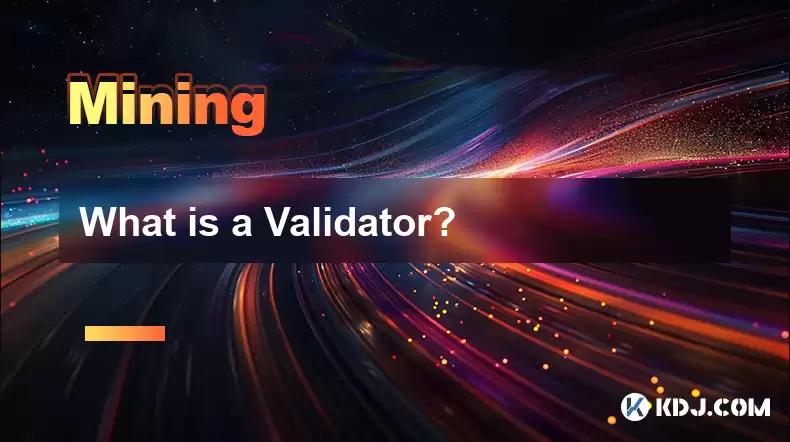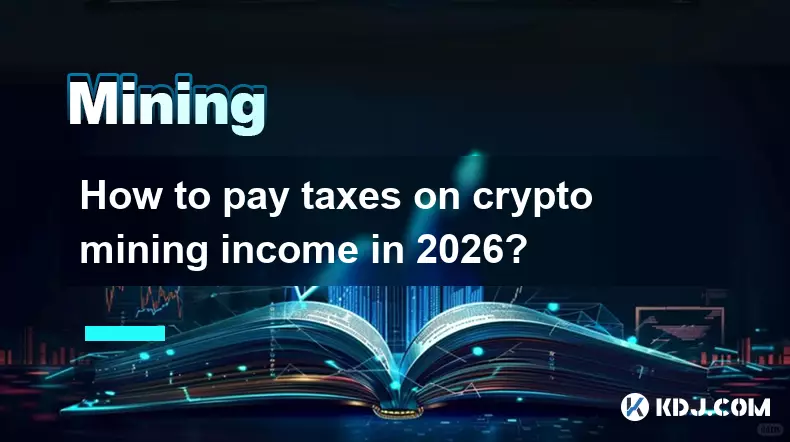-
 bitcoin
bitcoin $87959.907984 USD
1.34% -
 ethereum
ethereum $2920.497338 USD
3.04% -
 tether
tether $0.999775 USD
0.00% -
 xrp
xrp $2.237324 USD
8.12% -
 bnb
bnb $860.243768 USD
0.90% -
 solana
solana $138.089498 USD
5.43% -
 usd-coin
usd-coin $0.999807 USD
0.01% -
 tron
tron $0.272801 USD
-1.53% -
 dogecoin
dogecoin $0.150904 USD
2.96% -
 cardano
cardano $0.421635 USD
1.97% -
 hyperliquid
hyperliquid $32.152445 USD
2.23% -
 bitcoin-cash
bitcoin-cash $533.301069 USD
-1.94% -
 chainlink
chainlink $12.953417 USD
2.68% -
 unus-sed-leo
unus-sed-leo $9.535951 USD
0.73% -
 zcash
zcash $521.483386 USD
-2.87%
What is a Validator?
Validators in PoS networks play a crucial role in validating transactions, maintaining consensus, and securing the blockchain, requiring significant stake, computing power, and technical expertise.
Feb 24, 2025 at 06:48 pm

- Definition and Role of a Validator:
- Qualifications for Becoming a Validator:
- Responsibilities and Rewards of a Validator:
- Risks and Challenges of Being a Validator:
- Different Types of Validators:
- Choosing a Validator for Staking:
- Alternatives to Staking with a Validator:
In the world of proof-of-stake (PoS) cryptocurrencies, a validator is a network participant responsible for validating transactions and maintaining the blockchain's consensus mechanism. Unlike miners in proof-of-work (PoW) systems, validators achieve consensus by verifying and attesting to the validity of new blocks, rather than solving complex computational puzzles.
Qualifications for Becoming a ValidatorTo become a validator on a PoS network, certain requirements must be met:
- Stake: Validators must lock or "stake" a significant amount of the native cryptocurrency, demonstrating their commitment to the network's security.
- Computing Power: Validators require adequate computing resources, such as servers, to handle transaction verification and block processing.
- Network Connectivity: Validators must maintain a stable and high-speed internet connection to effectively participate in the consensus process.
As a validator, the primary responsibility is to validate transactions and attest to block proposals. They participate in consensus rounds and vote on the validity of new blocks. Validators are rewarded for their role in securing the network through the issuance of block rewards and transaction fees.
Risks and Challenges of Being a ValidatorWhile being a validator offers the potential for rewards, it also comes with inherent risks and challenges:
- Slashing: Validators can lose their staked cryptocurrency if they engage in malicious activities or exhibit persistent unavailability.
- Connectivity Issues: Network outages or connection problems can lead to missed validations and potential penalties.
- Technical Complexity: Operating a validator node involves technical expertise in cryptography, networking, and software deployment.
The term "validator" encompasses various types of network participants with specific roles and responsibilities:
- Solo Validators: Individuals or entities that operate their own validator nodes independently, staking their own cryptocurrency.
- Pool Validators: Groups of individuals or entities that combine their resources and stake collectively to increase their chance of producing blocks.
- Delegated Validators: Validators who act on behalf of delegators, who stake smaller amounts of cryptocurrency to support the validation efforts of others.
When selecting a validator for staking, consider the following factors:
- Uptime and Stability: Opt for validators with a proven track record of high uptime and reliable performance.
- Reputation: Research the validators' online presence, community engagement, and any previous incidents or controversies.
- Fees: Validators may charge fees for their services, including a percentage of block rewards or a flat rate. Compare fees and choose a validator that aligns with your expectations.
If direct validation is not feasible, alternative options for earning rewards on PoS networks include:
- Staking Pools: Pools allow users to stake smaller amounts without the technical requirements or risks of individual validation.
- Delegating: Delegators can allocate their stake to third-party validators, earning a portion of the rewards (up to 10%).
- Centralized Exchanges: Some exchanges offer staking services, providing users with ease of access but potentially sacrificing decentralization and control.
The minimum stake varies depending on the specific blockchain network. For example, on Ethereum, individual validators require a minimum stake of 32 ETH.
2. How often are validators rewarded?The frequency of rewards depends on the network's block time. On Ethereum, validators typically earn rewards every 12-24 hours, while on Solana, rewards are distributed more frequently (every few seconds).
3. Is it possible to lose staked funds?Yes, validators can lose their staked cryptocurrency due to slashing. This can occur if they engage in malicious activities, experience persistent unavailability, or make extensive false attestations.
4. What are the benefits of delegating rather than validating directly?Delegation offers lower technical barriers and risks, as well as the option to delegate to multiple validators for diversification. However, delegators may earn lower rewards than solo validators.
5. What is the difference between pooled and solo validators?Pooled validators aggregate stakes from multiple delegators, increasing their chances of producing blocks. Solo validators operate independently with their own stake.
Disclaimer:info@kdj.com
The information provided is not trading advice. kdj.com does not assume any responsibility for any investments made based on the information provided in this article. Cryptocurrencies are highly volatile and it is highly recommended that you invest with caution after thorough research!
If you believe that the content used on this website infringes your copyright, please contact us immediately (info@kdj.com) and we will delete it promptly.
- Royal Mint 50p Coin: Rare Listing for Peter Rabbit Sparks Collecting Frenzy (and Caution)
- 2026-02-08 22:30:02
- Markets at a 2026 Turning Point: Navigating Volatility and Shifting Narratives
- 2026-02-08 22:15:01
- Bitcoin's Big Dip: Navigating the Crypto Market's Latest Volatility Wave
- 2026-02-08 22:10:02
- RWA Yacht Charter Hits the High Seas: Investing Yachts Docks Innovation with Tokenized Luxury
- 2026-02-08 22:20:02
- Bitcoin Mining Difficulty Plummets 11% in Largest Drop Since China Ban, Fueled by Price Slump and U.S. Storms
- 2026-02-08 22:00:01
- Heads Up, History Buffs! Super Bowl Coin Toss Flips a Franklin-Fueled Libertas Americana, Merging Gridiron Glory with Colonial Cool
- 2026-02-08 22:00:01
Related knowledge

How to mine crypto sustainably in 2026?
Feb 07,2026 at 04:20pm
Energy Source Optimization1. Miners increasingly deploy solar arrays directly on warehouse rooftops to power ASIC rigs during daylight hours. 2. Geoth...

How to mine Conflux on a standard gaming laptop?
Feb 07,2026 at 04:19am
Hardware Requirements for Conflux Mining1. Conflux uses a proof-of-work consensus mechanism called Tree-Graph, which is designed to be ASIC-resistant ...

How to buy hashing power on cloud mining platforms?
Feb 08,2026 at 05:59pm
Understanding Cloud Mining Contracts1. Cloud mining platforms offer users the ability to rent hashing power without owning or maintaining physical har...

How to mine Flux with a 30-series Nvidia GPU?
Feb 07,2026 at 02:40pm
Market Volatility Patterns1. Bitcoin price movements often exhibit sharp intraday swings exceeding 5% during low-liquidity windows, particularly betwe...

How to pay taxes on crypto mining income in 2026?
Feb 07,2026 at 01:20am
Tax Classification of Mining Rewards1. Cryptocurrency received as mining rewards is treated as ordinary income by most major tax jurisdictions includi...

How to find the lowest fee mining pools for BTC?
Feb 07,2026 at 01:00pm
Fee Structure Transparency1. Most reputable BTC mining pools publish their fee schedules directly on their official websites, often under sections lab...

How to mine crypto sustainably in 2026?
Feb 07,2026 at 04:20pm
Energy Source Optimization1. Miners increasingly deploy solar arrays directly on warehouse rooftops to power ASIC rigs during daylight hours. 2. Geoth...

How to mine Conflux on a standard gaming laptop?
Feb 07,2026 at 04:19am
Hardware Requirements for Conflux Mining1. Conflux uses a proof-of-work consensus mechanism called Tree-Graph, which is designed to be ASIC-resistant ...

How to buy hashing power on cloud mining platforms?
Feb 08,2026 at 05:59pm
Understanding Cloud Mining Contracts1. Cloud mining platforms offer users the ability to rent hashing power without owning or maintaining physical har...

How to mine Flux with a 30-series Nvidia GPU?
Feb 07,2026 at 02:40pm
Market Volatility Patterns1. Bitcoin price movements often exhibit sharp intraday swings exceeding 5% during low-liquidity windows, particularly betwe...

How to pay taxes on crypto mining income in 2026?
Feb 07,2026 at 01:20am
Tax Classification of Mining Rewards1. Cryptocurrency received as mining rewards is treated as ordinary income by most major tax jurisdictions includi...

How to find the lowest fee mining pools for BTC?
Feb 07,2026 at 01:00pm
Fee Structure Transparency1. Most reputable BTC mining pools publish their fee schedules directly on their official websites, often under sections lab...
See all articles










































































